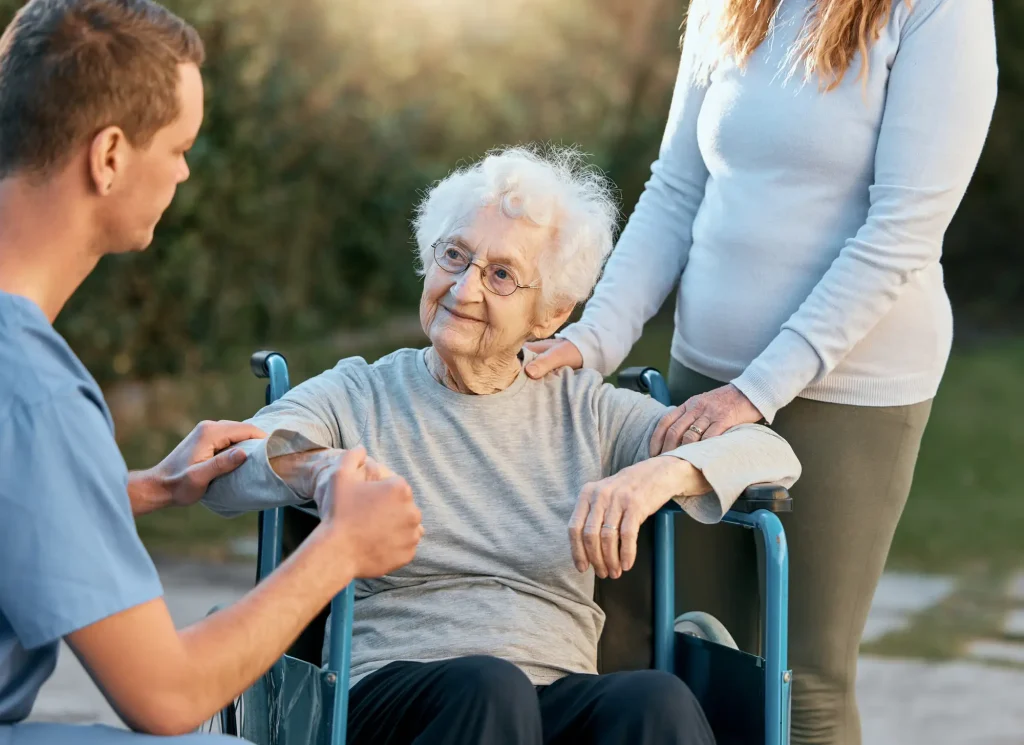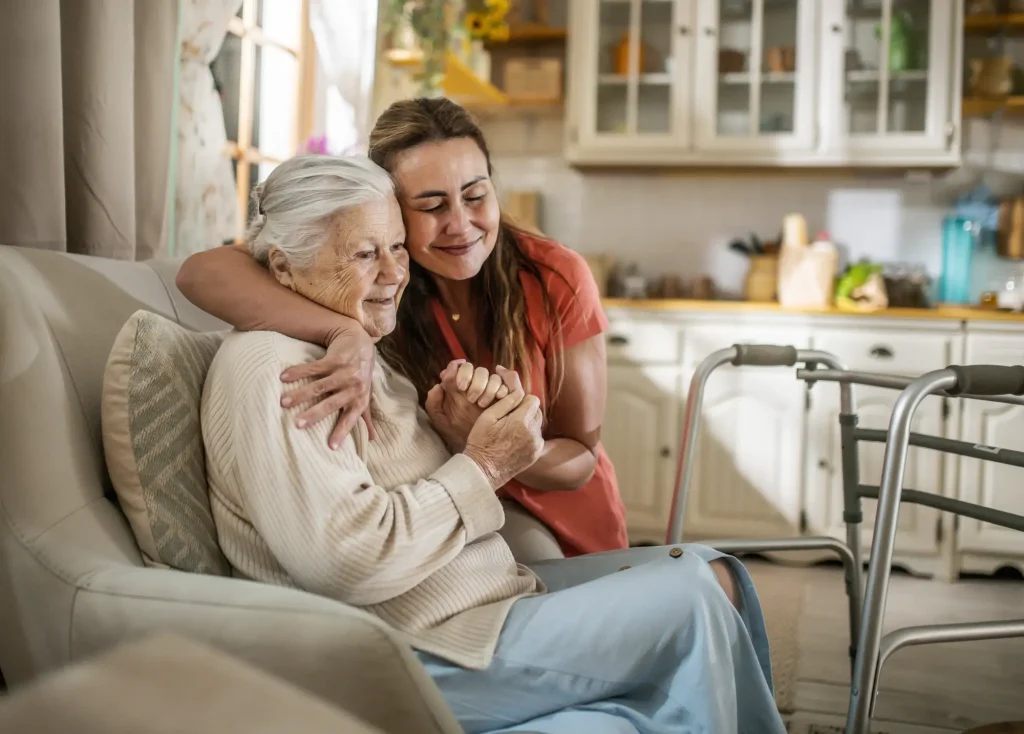When your parent or loved one requires professional short or long term medical care, Skilled Nursing care at a multiservice community like Notre Dame Health Care in Worcester, MA, is an excellent solution.
But what exactly is Skilled Nursing for Long Term Care? Who is it for? What services apply? And where can you find it?
Let’s walk through exactly what skilled nursing care involves, who benefits most from it, and how to know when it’s the right choice for your family.
What Is Skilled Nursing Care?
Skilled Nursing for Long Term Care refers to professional medical services provided by licensed providers—registered nurses (RNs), licensed practical nurses (LPNs), and therapists (physical, occupational, and speech)—who deliver clinical treatments that family members and non-medical caregivers cannot.
This level of care goes beyond personal assistance with activities of daily living (ADLs). We’re talking about managing IVs, administering injections, monitoring vital signs, treating wounds, and overseeing complex medication regimens.
Who Is Skilled Nursing Care For?
Adults Requiring 24/7 Medical Support
Anyone whose health is too fragile for assisted living or whose medical demands exceed what family caregivers and home health can safely provide. This includes seniors who require tube feeding or catheterization, or adults with conditions that could deteriorate rapidly without professional oversight.
Seniors with Chronic Conditions
Adults managing conditions like congestive heart failure, advanced diabetes, COPD or Parkinson’s disease often need around-the-clock care to maintain stability. These conditions require constant medication adjustments, symptom monitoring, and immediate response when problems arise—exactly what licensed nursing care provides.
Seniors Recovering from Surgery or Injury
Senior recovery care is essential after major operations, such as hip replacements, heart procedures or abdominal surgeries. Your loved one needs professional wound monitoring, pain management, and physical rehabilitation to heal properly. Transitional senior care bridges the gap between hospital and home, providing the intensive support necessary for a safe recovery.

Skilled Nursing for Long Term Care Team Members
- Registered nurses (RNs) coordinate care plans and perform complex medical procedures. Licensed practical nurses (LPNs) handle medication administration and daily medical monitoring.
- Physical and occupational therapists, plus speech-language pathologists, provide rehabilitative care for seniors recovering from illness or injury.
- Social workers and dietitians ensure your loved one receives comprehensive geriatric care services that address physical, emotional, and nutritional needs.
Services Provided
Medical Monitoring and Medication Management
Daily medical support includes continuous monitoring of vital signs like blood pressure, heart rate, and oxygen levels—especially critical for seniors with unstable conditions. Nurses manage complex medication schedules, ensure prescriptions are taken correctly, and watch for adverse reactions or interactions.
Therapy Services (Physical, Occupational, Speech)
Skilled Rehabilitation for seniors involves intensive therapy programs tailored to each person’s recovery goals:
- Physical therapy helps rebuild strength, balance, and mobility after an injury.
- Occupational therapy focuses on regaining fine motor skills and the ability to perform ADLs like bathing and dressing.
- Speech therapy addresses swallowing difficulties and communication challenges following strokes or neurological changes.
Wound Care and IV Therapy
Skilled care services include specialized treatments like wound care for pressure sores, surgical incisions or diabetic ulcers, which require sterile techniques and professional assessments. IV therapy administration—whether for antibiotics, hydration or nutrition—demands medical expertise to prevent and protect against complications.
Post-Acute and Long Term Care Support
Post-acute, or short-term, care is designed for seniors who are discharged from a hospital but still need continued medical attention and support to fully recover.
Long term care support provides ongoing daily medical support for those with chronic conditions requiring permanent nursing supervision. Both represent crucial senior care options when medical needs exceed what families can manage at home.

Other Types of Senior Care vs. Skilled Nursing
Assisted Living vs. Skilled Nursing
Assisted Living supports relatively independent seniors who need help with personal care—bathing, dressing, medication reminders—but don’t require actual medical treatment. Think of it as aging-in-place alternatives with assistance.
Skilled Nursing for Long Term Care, by contrast, provides medical care delivered by licensed professionals. If your dad just needs reminders to take his pills, Assisted Living works. If he needs a nurse to administer insulin injections and monitor his glucose levels throughout the day, that’s Skilled Nursing territory.
Skilled Nursing vs. Home Health Care
Home health care brings nurses and therapists to your loved one’s residence for scheduled visits—maybe a few hours daily or several times weekly. It’s appropriate when medical needs are moderate and intermittent.
Skilled nursing facilities offer 24/7 elder care with professionals immediately available whenever issues arise. The difference matters during nighttime emergencies or when conditions change rapidly.
When Is It Time for Skilled Nursing?
- Your loved one requires 24-hour nursing care levels beyond what family or daytime home health services can provide.
- Medical complications demand immediate professional intervention.
- Recovery needs intensive, supervised therapy programs.
- Safety concerns make living at home too risky.
- Post-acute rehab care requires daily skilled services.
Finding the Best Skilled Nursing Provider for Your Family
What to Ask
- What’s the nurse-to-resident ratio on each shift?
- Are therapists on staff or contracted from outside?
- How do you handle emergencies after hours?
- What’s your process for communicating with families?
- Can you accommodate special medical equipment or dietary needs?
- What’s the lifestyle like? Are there opportunities to socialize or participate in life-enriching programs?
What to Observe
- Watch how staff members interact with residents. Do they make eye contact? Speak respectfully? Respond promptly to call buttons?
- Are residents wearing clean clothes? Do they look well cared for, or do they appear disheveled?
- Are residents engaged and happy or isolated?
- Is the community clean and odor-free?
- Do meals look and smell appetizing?
- How does the community make you feel? This is where your loved one will live. The environment must feel safe and welcoming to you both.

Care That Honors Your Loved One
Choosing Skilled Nursing for Long Term Care represents one of the hardest decisions you’ll face as an adult child. Your parent needs medical expertise they can’t receive at home, but you want more than clinical competence. You want warmth, dignity, and respect for who they are.
Contact us today to schedule a tour and see how Notre Dame Health Care can help your loved one heal, manage chronic conditions, and live a meaningful, fulfilling life. For families unable to visit in person, virtual tours are available upon request by phone.
